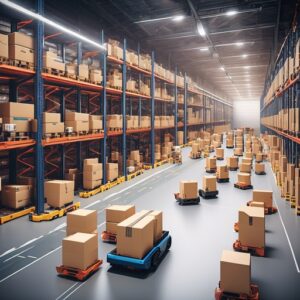In the realm of agriculture, efficiency is key to success. From planting seeds to harvesting crops, every step in the farming process requires meticulous planning and execution. However, managing logistics can often pose a significant challenge for farmers, especially those operating on a smaller scale. This is where Third-Party Logistics (3PL) services come into play, offering a range of benefits to streamline farm operations and enhance overall productivity. In this article, we’ll explore how farms can leverage 3PL services to optimize their supply chain management, reduce costs, and improve customer satisfaction.
Understanding 3PL Services
Definition and scope of 3PL: Third-Party Logistics involves outsourcing logistics functions to specialized companies that handle transportation, warehousing, inventory management, and distribution.
Types of 3PL providers: There are different types of 3PL providers ranging from freight forwarders to warehouse and distribution centers, each offering specific services tailored to the needs of farms.
Collaborative approach: 3PL providers work closely with farms to understand their unique requirements and develop customized solutions that streamline operations.
Streamlining Transportation
Efficient freight management: 3PL providers leverage their networks and expertise to optimize transportation routes, reducing transit times and costs.
Access to diverse transportation modes: Farms can benefit from a range of transportation options including trucking, rail, and air freight, ensuring timely delivery of goods to markets.
Real-time tracking: Advanced logistics technology allows farms to monitor the movement of their goods in real-time, enhancing visibility and transparency throughout the supply chain.
Enhancing Warehousing and Distribution
Inventory management: 3PL providers offer sophisticated inventory management systems to track stock levels, minimize stockouts, and prevent overstocking.
Just-in-time delivery: By strategically locating warehouses near key markets, farms can ensure timely delivery of products, reducing inventory holding costs and improving cash flow.
Order fulfillment: 3PL providers streamline order processing and fulfillment, ensuring accurate and on-time delivery to customers, thereby enhancing customer satisfaction and loyalty.
Optimizing Supply Chain Efficiency
Scalability: 3PL services are scalable, allowing farms to adjust their logistics operations according to seasonal fluctuations in demand or changes in market conditions.
Risk mitigation: Outsourcing logistics functions to 3PL providers reduces the risk of disruptions such as equipment breakdowns or labor shortages, ensuring continuity of operations.
Focus on core competencies: By delegating logistics tasks to external experts, farms can focus their resources and energy on core activities such as crop cultivation and quality assurance, driving overall business growth.
Cost Savings and Competitive Advantage
Economies of scale: 3PL providers leverage their buying power and infrastructure to negotiate favorable rates with carriers and suppliers, helping farms achieve cost savings.
Reduced overhead costs: By outsourcing logistics functions, farms can eliminate the need for investing in expensive warehousing facilities, transportation fleets, and technology infrastructure, thereby reducing overhead costs.
Competitive pricing: Cost savings achieved through 3PL services enable farms to offer competitive pricing to customers, gaining a competitive edge in the market.
Meeting Regulatory Compliance
Compliance expertise: 3PL providers stay updated with the latest regulatory requirements and industry standards, ensuring farms remain compliant with food safety regulations, transportation laws, and environmental regulations.
Documentation management: From customs clearance to import/export documentation, 3PL providers handle all paperwork and documentation, simplifying compliance processes for farms.
Risk management: By ensuring regulatory compliance, farms mitigate the risk of fines, penalties, and reputational damage, thereby safeguarding their business interests.
Conclusion
In conclusion, Third-Party Logistics (3PL) services offer a myriad of benefits to farms, ranging from enhanced efficiency and cost savings to improved customer satisfaction and regulatory compliance. By outsourcing logistics functions to specialized providers, farms can streamline transportation, warehousing, and distribution operations, allowing them to focus on core competencies and drive business growth. Moreover, 3PL services provide scalability, risk mitigation, and access to advanced technology, empowering farms to stay competitive in a rapidly evolving agricultural landscape. As farms embrace the advantages of 3PL, they position themselves for long-term success in the dynamic world of agriculture.


